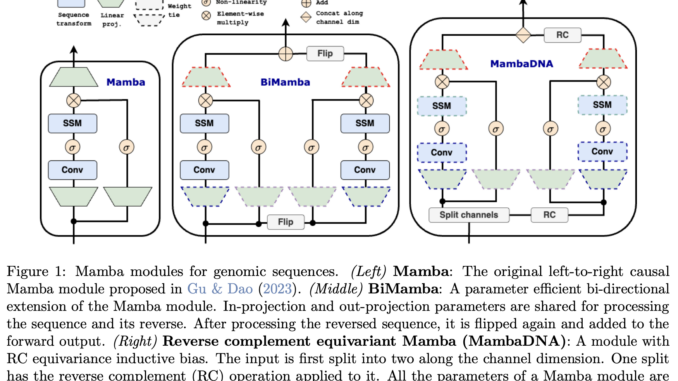
[ad_1]
In the domain of biotechnology, the intersection of machine learning and genomics has sparked a revolutionary paradigm, particularly in the modeling of DNA sequences. This interdisciplinary approach addresses the intricate challenges posed by genomic data, which include understanding long-range interactions within the genome, the bidirectional influence of genomic regions, and the unique property of DNA known as reverse complementarity (RC). The recent advancements in this field have led to the development of innovative methods and tools to enhance the accuracy and efficiency of genomic sequence modeling.
One of the persistent issues in genomic research is the complexity of accurately modeling long-range interactions within DNA sequences. Traditional approaches often need to capture the extensive and nuanced relationships across the genome’s vast expanse. This limitation has urged researchers to explore new methodologies that can adeptly handle these long-range dependencies while accommodating the bidirectional nature of genetic influence and the RC characteristic of DNA strands.
In response to these challenges, a new approach has emerged by a collaborative effort among researchers from Cornell University, Princeton University, and Carnegie Mellon University. This innovative method introduces a novel architecture designed to effectively address the intricacies of genomic sequence modeling. The foundation of this approach is the development of the “Mamba” block, which has been further enhanced to support bidirectionality through the “BiMamba” component and to incorporate RC equivariance with the “MambaDNA” block.
The MambaDNA block serves as the cornerstone for the “Caduceus” models, a pioneering family of RC-equivariant, bidirectional long-range DNA sequence models. These models have been meticulously crafted not only to understand the conventional aspects of genomic sequences but also to interpret the complex reverse complementarity and bidirectional influences. By leveraging this advanced architecture, Caduceus models have shown promise and demonstrated superior performance over previous long-range models in various downstream benchmarks, especially in predicting the effects of genetic variants, a task known for its reliance on understanding long-range genomic interactions.
They outperform significantly larger models but need a more sophisticated understanding of bi-directionality and equivariance. This achievement underscores the approach’s effectiveness in capturing the essential features of genomic sequences, critical for various applications in biology and medicine. By introducing a novel pre-training and fine-tuning strategy, these models set a new standard in the field, promising to accelerate progress in genomics research.
In conclusion, the development of Caduceus models represents a significant milestone in the integration of machine learning with genomics. This research not only addresses the longstanding challenges in modeling DNA sequences but also opens new avenues for exploring the genetic basis of life. The implications of this work are vast in our understanding of diseases, genetic disorders, and the intricate mechanisms that govern biological systems. As the field continues to evolve, the contributions of this research will undoubtedly play a pivotal role in shaping the future of genomics.
Check out the Paper, Project, and Github. All credit for this research goes to the researchers of this project. Also, don’t forget to follow us on Twitter and Google News. Join our 38k+ ML SubReddit, 41k+ Facebook Community, Discord Channel, and LinkedIn Group.
If you like our work, you will love our newsletter..
Don’t Forget to join our Telegram Channel
You may also like our FREE AI Courses….
![]()
Sana Hassan, a consulting intern at Marktechpost and dual-degree student at IIT Madras, is passionate about applying technology and AI to address real-world challenges. With a keen interest in solving practical problems, he brings a fresh perspective to the intersection of AI and real-life solutions.
[ad_2]
Source link





Be the first to comment